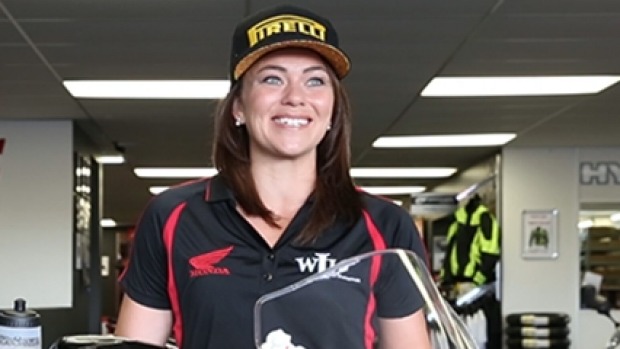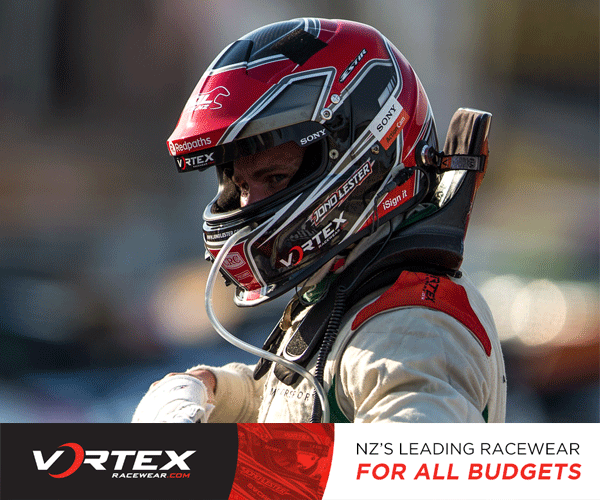Catch Avalon Biddle if you can when she’s on a motorbike. As a New Zealand Grand Prix winner, Glen Williams once said, “she’s stinking quick.”
On a balmy Spanish day in September 2015, flattened against the white fuel tank of her Honda CBR650F she winds the throttle wide on the Jerez circuit, south of Seville. The crowd of 70,000 is a blur, their cheers masked by the wind whipping over her bright pink helmet. She hits speeds of 220kmh. When the race finishes Biddle is the women’s European Cup champion.
On the other hand, if you want a quick commute from Whangaparoa to Takapuna, where she works five months of the year at Hyosung Motorcycles on Barry’s Point Rd, don’t try to slipstream her aged Ford Laser. On four creaky wheels on our roads she’s the ultimate nana driver, never breaking the speed limit, because, in blunt terms, she can’t afford any fines.
Biddle takes on the world, and wins, in a sport dominated by flashy Europeans, by big money, and by men who in countries like Spain and Italy are worshipped like football stars.
By comparison she’s a 23-year-old, 153cm woman from the sleepy seaside town of Orewa, running shoestring campaigns partly financed by what she calls her mother Bev’s “world famous in New Zealand chocolate chip cookies” that Bev sells at cake stalls in the pits at race meets.
Old geezers who bleat about women’s tennis and cricket might be astounded to discover that in European and New Zealand motorcycling men and women race together.
Biddle has left a lot of men in her wake, although she doesn’t gloat about it, noting that “once you get on the helmets and the leathers, it’s hard to tell the women from the men anyway.”
There are no special favours for women in the big, jostling fields. “It can get pretty crazy. You can finish a race with the paint of someone else’s bike scraped onto your bike.”
Friends and family still laugh over what happened after Biddle chased a visiting German rider all the way for a second place at the Manfield circuit in Palmerston North. When she took her helmet off on the podium a friend of the German’s blurted out, “F…, it’s a girl.”
Meet her and you start to understand why she does so well. There’s something indomitable about Avalon Biddle. For her the glass isn’t so much half full as brimming over.
She tells stories about crashes that by rights should make her cringe, and then laughs. Hitting a speed of 264kmh on the huge Mugello track in Italy while riding a 600cc bike wasn’t nerve-wracking, just exhilarating.
There’s no angst when she notes that male riders have a natural physical advantage over her. They have longer arms than her “little short ones”, a huge help when it comes to wrestling a 180kg bike round a race track for 45 minutes. She’s not complaining. It’s just a fact.
Anyway, she now goes to a specialist motorsport gym in Silverdale, Formula Fit, and in the past two years her fitness and strength levels have zoomed.
Don’t confuse the cheerful nature for frailty. She’s competed with an arm in plaster, raced almost a full season with a titanium rod in her leg, and finished races on a homemade Italian motorbike where changing gear was so hard her foot was bleeding.
As she’s got older and better crashes are less frequent. But she’s had a few. Thankfully she hasn’t broken a bone since she was 17, although by then she had fractured 10 different bones in two years.
She swears that modern leather suits, gloves and boots mean the occasional slide across a track isn’t as painful as it looks. There is one exception to the no pain rule, and it’s happened to her eight or nine times.
“Sometimes if you crash on the exit of a corner when you’re really hard on the throttle, the rear wheel comes around and it flicks you up to the moon, and you’re up there long enough to have time to think, ‘Oh, this is really going to hurt.'”
There’s family history behind her talent, and her courage.
Her late father Keith, was a speedway bike racer. Some of her earliest memories are of going with her Dad and her older brother Travers to speedway, to drag racing, to the V8s at Pukekohe, smelling the heady mix of scorching rubber and burning fuel, and, most of all, being entranced by the speed. “I loved it all,” she says now.
Keith’s brother, Bruce, was a rider too, a cyclist so good he remains the only Kiwi to ever place in an Olympic road race, third at the 1972 Games in Munich. When Bruce rode through a rainstorm to win gold at the 1970 Commonwealth Games the team coach, Warwick Dalton, described the grit he showed by saying, “you saw him coming up that last hill, not a big man, basically just a ribcage with a massive heart pumping inside.” It’s not too fanciful to see some of the same qualities in Avalon.
Avalon started gathering her skill, nerve, and experience as a six-year-old when her father took her to compete in motocross, on a Yamaha 50cc automatic bike.
It wasn’t a perfect start. Dad coached her in most things, and the bike, as she says, only required you to turn the throttle and stay upright. He forgot one detail. How to turn. At the first corner the little girl blazed straight on into the safety ropes.
Things picked up, but she never enjoyed the jumps in motocross. However, “I loved the speed, which is why I kept doing it until I was 12.”
On her 13th birthday she found her sporting passion. Dad took her to a go-kart track in Mt Wellington where a very cheap form of road racing for bikes, called bucket racing, was run.
Riding a 100cc four stroke bike, she was competing almost exclusively against men who were much older than her. “As soon as I rode that bike I knew this was it. Dad built me a bike, and to this day I can still remember riding around the outside of 50-year-old men with my elbow on their tyre.”
Not all the bucket racers were veterans. Some were superbike riders who used the intense, crowded, short circuit racing for training.
They were impressed with the competitive nature of the teenager, encouraging her to get onto big tracks as soon as she could.
Before she turned 14 she was racing against teenage boys in Christchurch, where the Motorcycling Canterbury club was promoting races for promising riders.
The club loaned her a bike, a 150cc machine, which could be wound up to over 170km/h.
Things didn’t start well. Biddle isn’t tall today. At 13 she was tiny, and to her embarrassment when her bike started to fall on the grid in her first race she couldn’t keep it upright. “My feet couldn’t touch the ground, and I wasn’t very strong either.”
Two crashes on borrowed bikes followed, but her enthusiasm was undimmed.
She was desperate to have her own bike. Her father hunted out one that was lying in a back shed in Orewa. The Suzuki RG150 was dirty, even rusty in parts, but at $800 the price was right, and he tidied it up enough for Avalon to enter her first national championship race, in Invercargill, in 2007.
About 50 or so racers, all but three of them males, some of them highly experienced, lined up for the start. Biddle won, and broke the lap record.
Next weekend in Timaru she finished in the top three in the first two races, but then she crashed in the third race, and broke her arm.
That was when it became hard to hide the fact from her Pinehurst School classmates in Albany that the reason she often looked tired on Monday was because she’d been racing in the weekend.
The broken arm was when she had to come clean. “Not many teenage girls get their arm broken in the weekend.” Her classmates, she thinks, were probably puzzled by her obsession.
Academically she was gifted. In her second to last year at Pinehurst she topped New Zealand in geography in the Cambridge exams they sat at the school. In her last year she was first in the world in a physical education exam that involved complex physiology questions.
She hated wasting time. Her mother says she can’t recall Avalon ever sitting right through a movie if the family got a video.
There was so much to do. In her early teenage years there was the odd juxtaposition of Irish dancing contests, and motorsport. “She was just as competitive with her dancing as she was with her riding,” says Bev.
But the real clue to her future was how in the weekends she’d be up at 2am, glued to live television coverage of Grand Prix bike races in Europe. She’d fantasize about being there. “I couldn’t think of anything better.”
She put the dream on hold her first year out of school, studying for a sports science degree at Massey University in Albany.
But after a trip to Australia to race at Phillip Island, where she discovered she could keep pace with some of the male Grand Prix riders, she decided “to put all my eggs in the motor racing basket.”
Racing in Europe, which she did for the first time in 2012 was spectacular, living up to all her expectations. The celebrations in the crowds, the parties in the pits, the dedication and professionalism of the riders, and the mechanics, were all manna to the 20-year-old.
It was also brutally expensive. As a newcomer you pay all your own travel and living costs, and the cost of the bike is about $NZ95,000 for the season. “The team makes money from you riding,” says Biddle. “You can reach a point where they pay for it, but it takes time.”
Biddle had huge help from WIL Sport, a company run by a Kiwi couple, Phil and Cheryl London, who financed her first year. “It was a massive struggle to get back for a second year, but a third season was going to be too expensive.”
She doesn’t have to look far to be reminded how tough finding funding for the sport can be. Her boyfriend, Jake Lewis, from Christchurch, was good enough to win the 2013 European Cup when it was only for men. His victory was a huge inspiration to her.
He sometimes tells Biddle she’s riding like a wuss, “and I get mad, because I know he could do it better.” But as talented as Lewis is, he won’t be in Europe this year because he can’t find the budget to race.
During her first European season in 2012, tragedy struck. Avalon’s father, who had quit his own speedway racing to spend all his spare time supporting her, was diagnosed with liver cancer. She flew back home, and 14 days later he passed away.
“It was a massive blow,” says Avalon, “but it was nice how many people here leant a hand. Everyone in the racing community stepped up, because they all knew him. I’m not a mechanic by any means, he looked after that, and to this day in New Zealand there are so many people who will help out.”
When racing in Europe started to look just too expensive to pursue an opportunity presented itself. It was vital. It was also a bit weird, if not downright dangerous.
“I got the chance to race a Grand Prix machine in the Italian championship in 2014. The family I lived with in Italy had a cousin who had a project building his own 250cc purebred race machine in a shed at the back of his home. The rest of the bikes came from massive factory teams.”
There were some parallels with the bikes the late Christchurch design genius John Britten built in the 1990s. But unlike the Britten V-1000, which is not only such a work of art it’s on display in Te Papa, but also reliable enough to win the legendary Battle of The Twins at Daytona, the Italian backyard bike was a beast. An unreliable, even treacherous, beast.
“You’d be travelling at 215km/h down the huge straight at Mugello, and the clutch would open up at the corner. You lose all stability, because you’ve got no engine braking. It’s like riding a bicycle at over 200km/h.
“The team manager would ask us why were braking so early. ‘Everyone is braking about 20 metres later than you.’ ‘We can’t change down gears down in time.’ We were braking halfway down the straight so we had enough time to get into first gear.”
Biddle’s male Italian team-mate dropped out after two races, saying, “This is just crazy.”
There were 10 races in the championship, and her bike blew up in eight of them. “It was a disaster of a year, but with hindsight it was the most important thing I’ve ever done, because it kept me up in Europe in the right circles, and I learned a lot. After that year I had the name and credibility to get an entry into the European Cup when they introduced it in 2015.”
The Cup is sponsored and run by Honda. “For 25,000 Euros ($NZ39,900) they transport all the bikes, they give you the fuel, they give you the tyres, the brake pads, and all the bikes are identical. So you and your mechanic turn up, and you have the bike on Friday, Saturday and Sunday from 9 to 5, and apart from that you aren’t allowed to touch the bikes. That’s how they keep a level playing field.
“It’s awesome, especially for a Kiwi, that you know you’ve got the same quality bike as everyone else.”
Last year, although she won the title, Biddle didn’t have the money to practice as much as she wanted. The other women got better as the season went on. She stayed about the same.
“This year Hyosung have helped out in lots of ways, and I’ve actually got the budget that will allow me to get a lot of practice in. This year I hope I can improve as the season goes on.”
Her 2016 campaign is off to a great start, finishing 44 seconds ahead of the next woman (and also ahead of 13 of the 27 men in the race) at the Aragon circuit in Spain. A year older, and a year stronger, she’s favoured to retain here title.
She’d like more. “I’m at the limit of racing with the women, and now I really need to step it up and start racing at the front with the boys. My next goal is to race in Supersport, which is the 600cc championship. I’m only one step away from that.”







